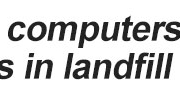Computer Composting
(Financial Post, October 1995)
“I don’t know much about computers, but one thing I do know is how to smash them up,” says Adam Freedman, introducing his father’s computer recycling business Hi Tech Recycling.
The idea to recycle unusable computer parts came to Adam’s father, Max Freedman as a result of his once-a-week volunteer work in a Toronto-based project that refurbishes outdated PCs for people who need retraining. “This first year I put in money to keep going, the second year we broke even.” This year, with the business savvy of his son who is actually a business consultant, Freedman says he might even make money and hire some help.
Max who retired from a career in electronics, operates out of an industrial building in Toronto. The warehouse is littered with boxes of circuit boards, precision electric motors, old hand-drives and tape units. On one side are the hulking ports of old mainframes and minicomputers. Nearby is a pile of old monitors.
Companies that used to just send their old junkers to the landfill are often happy to pack them off to be recycled instead, says Freedman. Mostly he hauls away old computers for free and relies on the scrap value of salvaged metals and parts to cover his cost. “This tape unit here,” he points to a massive one-by-two-by-three-foot machine that once graced a mainframe installation, “costs about $10,000. Used, it might have cost $2,500. I might get about $65 for it – if I take less than one hour to take it apart.”
Old circuit boards are sent in bulk to commercial refiners who grind them up and then process the grinds in furnaces at increasingly high temperatures to extract the metal like tin, copper and lead. Old disk-drives and other parts with metal frames and chassis are simply sold off for their scrap metal value at anywhere from 2 to 10 cents a pound.
The margins are so low that sometimes he has to charge companies his trucking costs to take away their unwanted computers.
“If I look over a lot and see that there’s nothing there with any recycling value, I have to charge them.”
And, as if to prove the adage that one man’s junk is another man’s treasure, local artists and entrepreneurs occasionally drop by to scavenge interesting looking bits and pieces for sculptural works or to turn into computer jewelry.






